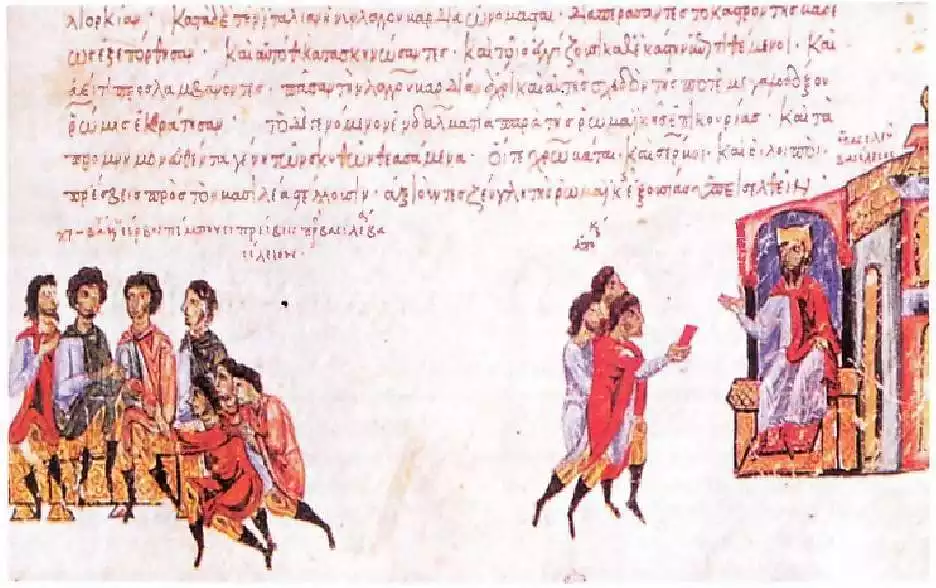
Nikephoros I, Byzantine Emperor from 802 to 811, significantly influenced the empire’s military and administrative realms. Born around 755 and meeting his demise in 811 at the Battle of Pliska, his reign was marked by ambitious military campaigns and notable administrative reforms. His leadership, albeit brief, left an indelible mark on the Byzantine Empire, shaping its geopolitical and internal policies.
Early Life and Ascension to Power
Nikephoros I emerged from relative obscurity, initially serving as the empire’s finance minister. His adeptness in administration and finance paved the way for his unexpected rise to the throne following the deposition of Empress Irene. In 802, Nikephoros I ascended as emperor, bringing a pragmatic approach to governance. His initial focus was on stabilizing the empire’s finances, plagued by years of mismanagement and economic turmoil.
Moreover, Nikephoros I’s reign was pivotal in reshaping the empire’s military strategies. Faced with external threats, he embarked on numerous campaigns to fortify the empire’s borders. His military expeditions, particularly against the Bulgars, were driven by a vision to reassert Byzantine dominance in the Balkans. These campaigns, while initially successful, later proved costly, both in terms of resources and manpower.
Administrative Reforms and Domestic Policies
Alongside his military endeavors, Nikephoros I was a keen reformer. He implemented significant administrative changes, aimed at streamlining governance and enhancing fiscal stability. One of his notable reforms was the revision of the tax system. By reorganizing the tax structure, he aimed to alleviate the burden on the peasantry while ensuring a steady flow of revenue to the imperial treasury.
Furthermore, his administrative reforms extended to the legal sphere. Nikephoros I sought to consolidate and update the empire’s legal codes, striving for a more equitable and efficient judicial system. These reforms, though less glorified than his military campaigns, were crucial in laying the groundwork for the Byzantine Empire’s long-term stability and prosperity.
Nikephoros I’s domestic policies also included efforts to bolster the empire’s economic base. Recognizing the importance of a strong economy, he implemented measures to stimulate trade and agriculture. His initiatives aimed at revitalizing the empire’s economy laid the foundations for future growth and stability.
Expansion and Conflict with the Bulgars
Nikephoros I’s reign is notably marked by his military campaigns against the Bulgar Khanate. His determination to reclaim territories lost to the Bulgars led to several military expeditions. Initially, these campaigns were successful, bolstering his reputation as a capable military leader. However, the tide turned in 811 when Nikephoros I launched a large-scale invasion into Bulgar territory. This campaign culminated in the disastrous Battle of Pliska, where Nikephoros I met his end, severely weakening Byzantine influence in the region. This defeat marked a significant turning point in Byzantine-Bulgar relations and had long-lasting repercussions for the empire.
Religious Policies and Cultural Impact
Religiously, Nikephoros I maintained a pragmatic approach. He sought to balance the needs of the Orthodox Church with the state’s interests, often leading to complex interactions with religious authorities. His reign saw no major religious upheavals, indicating a period of relative stability in this domain. Culturally, Nikephoros I’s impact was less direct but still significant. His reign coincided with a period of artistic and intellectual activity, reflecting the broader trends of the Byzantine Renaissance.
In conclusion, Emperor Nikephoros I’s reign was a period of significant transformation for the Byzantine Empire. His administrative and military initiatives, although ambitious, were met with mixed outcomes. His death in the Battle of Pliska was a stark reminder of the challenges facing the empire. Despite the setbacks, his contributions to administrative reforms and efforts to stabilize the empire’s economy had lasting impacts. Nikephoros I’s reign, albeit brief, was a critical chapter in the Byzantine Empire’s storied history.
References
- Haldon, John. “The Byzantine Wars: Battles and Campaigns of the Byzantine Era.” Tempus Publishing, 2001.
- Jenkins, Romilly. “Byzantium: The Imperial Centuries, AD 610-1071.” University of Toronto Press, 1987.
- Norwich, John Julius. “Byzantium: The Apogee.” Alfred A. Knopf, 1992.
- Treadgold, Warren. A History of the Byzantine State and Society.” Stanford University Press, 1997.
- Whittow, Mark. “The Making of Byzantium, 600-1025.” University of California Press, 1996.
